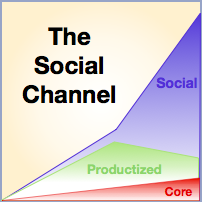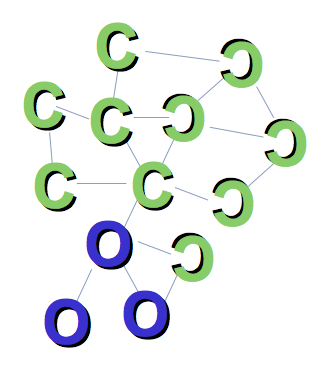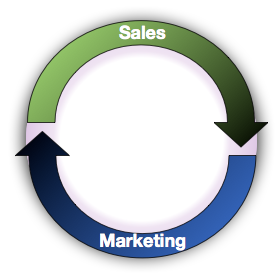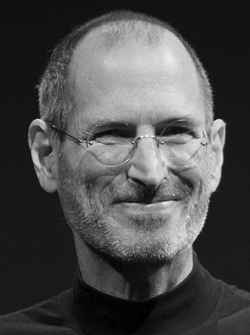Social Channel Three: Using the Social Channel to Defend Native Markets and Penetrate Foreign Markets
 The global Social Channel will reintroduce “home court advantage” to national brands because those that use social business to compete globally by collaborating with users will have the cultural advantage; “foreign” firms may have better product features for the money, but they will not match home brands’ cultural fluency. Personalized service and attention are culturally specific, and deep cultural fluency directly correlates to intimacy. However, brands can only develop the home court advantage by practicing social business at an advanced level. Most have a long way to go and, meanwhile, they will get hammered when they persist in competing on product features in the Productized Channel of Value. The global Social Channel will reintroduce “home court advantage” to national brands because those that use social business to compete globally by collaborating with users will have the cultural advantage; “foreign” firms may have better product features for the money, but they will not match home brands’ cultural fluency. Personalized service and attention are culturally specific, and deep cultural fluency directly correlates to intimacy. However, brands can only develop the home court advantage by practicing social business at an advanced level. Most have a long way to go and, meanwhile, they will get hammered when they persist in competing on product features in the Productized Channel of Value.
The blade cuts both ways: the home court advantage will make exporting to emerging markets much more difficult in the years ahead. The Social Channel will raise the bar because users in all markets will increasingly expect brands to relate to them and to solicit their input and advice. Brands will have to invest significantly in developing in-market social […]
How Marketers Are Pushing the Wrong Button on Mobile

Mobile advertising is flawed because it interrupts. CMOs’ continued use of such outmoded marketing tactics isn’t pretty, like bursting market bubbles or parties at which one has stayed too long. Screen-hogging banners or tricky apps are unnecessary for those who understand the mobile experience and how to add value; however, they are very effective for alienating clients and customers. As Stan Rapp puts it, “Don’t do things to people (do things with them).” In the interest of doing mobile right, I’ll juxtapose the mobile experience with advertising to show how inappropriate much of it is before suggesting how marketers and brands can add value and avoid destroying trust.
“Everybody hates digital ads.” This is a refrain I’ve heard forever, and I have never heard anyone say that they like them. People don’t even like big screen […]
Social Channel Two: Understanding the Social Channel of Value by Examining Its Precedents
 Meet the Social Channel of Value, the new arena where brands compete for user (customer, client) attention and loyalty. Product features are losing their ability to differentiate because they are copied so easily. Moreover, the Social Channel of Value will transform human decision-making, organizations and institutions because it digitizes sociality, a core human trait, and its power will dwarf the power of the product and the brand. CEOs, CMOs and CPOs have a very rare social business opportunity to harness the Social Channel ahead of competitors and remake their markets. These are strong statements, but bear with me and I think you’ll appreciate why I’ve made them. Meet the Social Channel of Value, the new arena where brands compete for user (customer, client) attention and loyalty. Product features are losing their ability to differentiate because they are copied so easily. Moreover, the Social Channel of Value will transform human decision-making, organizations and institutions because it digitizes sociality, a core human trait, and its power will dwarf the power of the product and the brand. CEOs, CMOs and CPOs have a very rare social business opportunity to harness the Social Channel ahead of competitors and remake their markets. These are strong statements, but bear with me and I think you’ll appreciate why I’ve made them.
The Social Channel is the Knowledge Economy‘s analog to the Industrial Economy’s assembly line, which led to today’s brands and mass-produced products. Where the assembly line made fabrication ten times more efficient, digital social technologies will boost human communication and sociality by an order of magnitude. The “Social Channel of Value” shows how product and service features will […]
Social Channel One: Building Post-Product Relationships with Customers is how to Build Brands
 Pioneering brands are building post-product customer relationships in the social channel because they realize that product features are copied easily and serve as weak differentiators, which leads to pervasive commoditization. Moreover, people’s preferences for individualized information dealt mass media a lethal blow, and products firms will have a similar fate. Here’s why products will become extinct and how to guide your brand in building post-product customer relationships and profits. Pioneering brands are building post-product customer relationships in the social channel because they realize that product features are copied easily and serve as weak differentiators, which leads to pervasive commoditization. Moreover, people’s preferences for individualized information dealt mass media a lethal blow, and products firms will have a similar fate. Here’s why products will become extinct and how to guide your brand in building post-product customer relationships and profits.
I have predicted for years that mass customization would be the fate of “products,” and social business is bearing this out in spades, so here I’ll delve into how impersonal “products” will be rejected by customers in 5-15 years. More important, CMOs and brand stewards who appreciate this transformation will enjoy unusual advantage, and smart ones will prepare for it now. Brands that don’t get it will simply perish, and no one will even notice except their producers and vendors. Just think about the local papers and TV stations you have known.
This is Part One […]
Upgrading the Expert Role for the Knowledge Economy shows how knowledge workers can no longer seek refuge in their core expertise, and how to branch out.

“Experts” are regarded as the foremost authorities in their fields, the glib guru versions notwithstanding. An oft quoted maxim shows why: according to Malcolm Gladwell, for one, it takes 10,000 hours [of study, work] for most people to become expert in something.* On a related front, Naveen Jain posits that experts will be less likely to solve today’s toughest problems because their expertise has become a box around them. All those degrees or promotions within the organization have focused their minds but also closed out creativity. While commenting on his post, I realized that redefining the expert would be necessary in the Knowledge Economy, so here I’ll offer some strategies and tactics for how to practice being an “expert” in the 21st century.
Notably, we can take lessons from experts and apply them to specialists, which are arguably less far along on the same vector—and more common.
[…]
Sam Fiorella, writing in The Social CMO, put together some fresh thinking on how to disrupt publishing, drawing some parallels with the music business in Open Letter to Media Publishers. Since their comments are turned off, I’ll offer some additional thoughts here.
Sam, thanks for one of the most intelligent posts I’ve read on the disruption of print I’ve seen in ages. Reading between the lines, I’ll offer this iteration.
[…]
Customer Service Is the New Marketing shows how CMOs can leverage digital world of mouth by leading teams to serve people publicly.
 In most brand organizations, marketing investments rest on 20th century marketing principles whose results are diminishing every year. At the same time, an increasing portion of products and services are commoditizing, which puts more pressure on marketing to “create” differentiation and value. In many cases, there is no escape—except by changing the rules. Here I’ll show how marketing can reinvent itself by using social business to tap a hidden gold mine. In most brand organizations, marketing investments rest on 20th century marketing principles whose results are diminishing every year. At the same time, an increasing portion of products and services are commoditizing, which puts more pressure on marketing to “create” differentiation and value. In many cases, there is no escape—except by changing the rules. Here I’ll show how marketing can reinvent itself by using social business to tap a hidden gold mine.
The Threat: Dire Straits in Marketing
Marketing as a profession emerged in leading economies during the mid 20th century, when manufactured products were novelties in many categories. Marketers came to assume that they could “create an image” or “brand” using the mass communications to which few had access. Individual customers had no leverage because word of mouth was analog. Word of mouth has always been the most trusted source of product or service information, but it had no leverage until social peer-to-peer technologies emerged. […]
2012 B2B Marketing Social Business Opportunities presents rare career and business opportunities for B2B marketing pioneers

It happens every time. Executives in regulated and specialized B2B industries see disruptive technologies rise above the horizon, and they discard them out of hand because “that doesn’t apply to our business.” This attitude temporarily serves as a self-fulfilling prophesy, but it subsequently falls by the wayside.
Having been in the vanguard of ebusiness transformation during the late 1990s and early 2000s as both management consultant and marketing executive, I believe that 2012 will see serious adoption of social business by pioneering B2Bs.
In November 2012, I laid out the rationale in “2012 Will See B2B Early Adopters Move on Social Business,” so here I’ll describe this year’s specific opportunities for B2B marketers.
[…]
B2B Customers Getting Social Fast: How Marketing and Sales Can Evolve explains how clients/customers are smarter and want a new kind of relationship | The new economics of business reputation
 While preparing to launch Social Business Services for B2B Sales in January 2012, I have been engaged in its Ecosystem Audit. I have plumbed online conversations about B2B Sales and Marketing adoption of social business (erstwhile social media). I have been struck by a recurring realization: a large part of Marketing and Sales as we know them is significantly out of alignment with B2B customers. Social business is permeating customer networks throughout the economy and changing customer behavior and expectations. This has created a rare opportunity for B2B marketing and sales people who understand and respond ahead of the market. If I’m right, this could be one of the most important posts you read this year. While preparing to launch Social Business Services for B2B Sales in January 2012, I have been engaged in its Ecosystem Audit. I have plumbed online conversations about B2B Sales and Marketing adoption of social business (erstwhile social media). I have been struck by a recurring realization: a large part of Marketing and Sales as we know them is significantly out of alignment with B2B customers. Social business is permeating customer networks throughout the economy and changing customer behavior and expectations. This has created a rare opportunity for B2B marketing and sales people who understand and respond ahead of the market. If I’m right, this could be one of the most important posts you read this year.
Two quick examples of misalignment: one of Marketing’s underlying assumptions is that it is not economically feasible to have large-scale one-on-one customer conversations, so marketing must […]
Steve Jobs Tribute: Behind the Fierce Competitor and Exacting Boss, the ardent desire to serve connected the creator, the visionary and the executive.
 Much has been written about Steve Jobs the creator, the technology visionary and the enterprise leader, but none of these personas entirely get to his essence. Steve Jobs was all these things, par excellence, but what deeply touched and inspired Apple’s customers and what made Steve bearable as a boss was an unconscious yet poignant feeling that he was there to serve people. He flew the flag of The Rest of Us. Unswervingly. Vehemently. Much has been written about Steve Jobs the creator, the technology visionary and the enterprise leader, but none of these personas entirely get to his essence. Steve Jobs was all these things, par excellence, but what deeply touched and inspired Apple’s customers and what made Steve bearable as a boss was an unconscious yet poignant feeling that he was there to serve people. He flew the flag of The Rest of Us. Unswervingly. Vehemently.
Without this higher calling, Steve would have been merely a successful tyrant. However, Steve’s commitment compelled thousands of brilliant and highly intelligent people to work for him and millions of customers to feel that Apple stood for something rare. Beige boxes and senseless software are optimized for profit, but Steve loathed mediocrity and its inherent compromises because they didn’t serve people, they acted at the expense of people. The desire to serve drove Steve Jobs, the creator, the leader and the innovator. Steve would […]
|
|
 The global Social Channel will reintroduce “home court advantage” to national brands because those that use social business to compete globally by collaborating with users will have the cultural advantage; “foreign” firms may have better product features for the money, but they will not match home brands’ cultural fluency. Personalized service and attention are culturally specific, and deep cultural fluency directly correlates to intimacy. However, brands can only develop the home court advantage by practicing social business at an advanced level. Most have a long way to go and, meanwhile, they will get hammered when they persist in competing on product features in the Productized Channel of Value.
The global Social Channel will reintroduce “home court advantage” to national brands because those that use social business to compete globally by collaborating with users will have the cultural advantage; “foreign” firms may have better product features for the money, but they will not match home brands’ cultural fluency. Personalized service and attention are culturally specific, and deep cultural fluency directly correlates to intimacy. However, brands can only develop the home court advantage by practicing social business at an advanced level. Most have a long way to go and, meanwhile, they will get hammered when they persist in competing on product features in the Productized Channel of Value.


 In most brand organizations, marketing investments rest on 20th century marketing principles whose results are diminishing every year. At the same time, an increasing portion of products and services are commoditizing, which puts more pressure on marketing to “create” differentiation and value. In many cases, there is no escape—except by changing the rules. Here I’ll show how marketing can reinvent itself by using social business to tap a hidden gold mine.
In most brand organizations, marketing investments rest on 20th century marketing principles whose results are diminishing every year. At the same time, an increasing portion of products and services are commoditizing, which puts more pressure on marketing to “create” differentiation and value. In many cases, there is no escape—except by changing the rules. Here I’ll show how marketing can reinvent itself by using social business to tap a hidden gold mine.
 While preparing to launch Social Business Services for B2B Sales in January 2012, I have been engaged in its Ecosystem Audit. I have plumbed online conversations about B2B Sales and Marketing adoption of social business (erstwhile social media). I have been struck by a recurring realization: a large part of Marketing and Sales as we know them is significantly out of alignment with B2B customers. Social business is permeating customer networks throughout the economy and changing customer behavior and expectations. This has created a rare opportunity for B2B marketing and sales people who understand and respond ahead of the market. If I’m right, this could be one of the most important posts you read this year.
While preparing to launch Social Business Services for B2B Sales in January 2012, I have been engaged in its Ecosystem Audit. I have plumbed online conversations about B2B Sales and Marketing adoption of social business (erstwhile social media). I have been struck by a recurring realization: a large part of Marketing and Sales as we know them is significantly out of alignment with B2B customers. Social business is permeating customer networks throughout the economy and changing customer behavior and expectations. This has created a rare opportunity for B2B marketing and sales people who understand and respond ahead of the market. If I’m right, this could be one of the most important posts you read this year. Much has been written about Steve Jobs the creator, the technology visionary and the enterprise leader, but none of these personas entirely get to his essence. Steve Jobs was all these things, par excellence, but what deeply touched and inspired Apple’s customers and what made Steve bearable as a boss was an unconscious yet poignant feeling that he was there to serve people. He flew the flag of The Rest of Us. Unswervingly. Vehemently.
Much has been written about Steve Jobs the creator, the technology visionary and the enterprise leader, but none of these personas entirely get to his essence. Steve Jobs was all these things, par excellence, but what deeply touched and inspired Apple’s customers and what made Steve bearable as a boss was an unconscious yet poignant feeling that he was there to serve people. He flew the flag of The Rest of Us. Unswervingly. Vehemently.